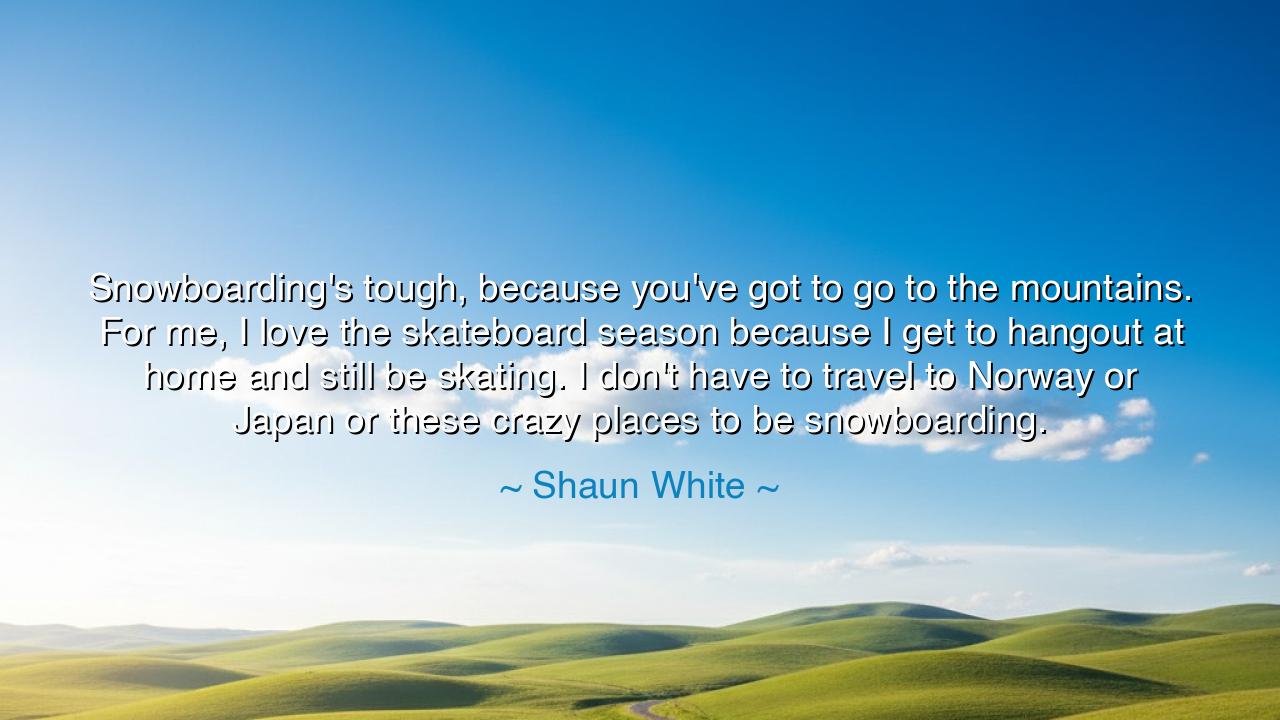
Snowboarding's tough, because you've got to go to the mountains.
Snowboarding's tough, because you've got to go to the mountains. For me, I love the skateboard season because I get to hangout at home and still be skating. I don't have to travel to Norway or Japan or these crazy places to be snowboarding.






Shaun White, the champion of board and snow, once confessed with the voice of one who knows both the exhilaration of triumph and the weariness of the road: “Snowboarding's tough, because you've got to go to the mountains. For me, I love the skateboard season because I get to hangout at home and still be skating. I don't have to travel to Norway or Japan or these crazy places to be snowboarding.” At first, these words sound lighthearted, even casual. But beneath them lies a profound truth about the tension between ambition and belonging, between the glory found in distant arenas and the peace discovered at home.
The origin of this thought is rooted in the dual life White has lived, straddling the worlds of snowboarding and skateboarding. In snowboarding, greatness demands pilgrimage. The mountains, high and remote, call the athlete far from the hearth, far from the familiar. The snow is fleeting, and the venues are scattered across the earth. To master it is to embrace constant travel, to leave home behind in pursuit of frozen summits. Yet in skateboarding, the field of battle is everywhere: the streets, the parks, the ramps close to home. There, one can practice without exile, finding freedom without forsaking one’s roots.
The ancients too understood this balance. Consider the story of Heracles, who roamed the earth completing labors in foreign lands, always leaving behind hearth and kin to conquer beasts and tyrants. His triumphs were immortal, but his life was one of wandering. In contrast, think of Cincinnatus, the Roman farmer who, after leading armies to victory, returned to his fields and found honor in the simple act of staying rooted. White’s reflection is a modern echo of these two archetypes: the hero pulled between the call of distant trials and the comfort of remaining close to home.
White’s mention of Norway and Japan is not merely geographical—it is symbolic of the sacrifices required to pursue the highest peaks of competition. These “crazy places” represent the cost of chasing mastery in a discipline bound to nature’s geography. The mountain demands travel, and travel demands sacrifice: of time, of presence, of the ease of familiar living. His love of skateboarding arises not from a lack of passion for snowboarding, but from the deep human yearning to find excellence without endless separation from home.
History offers us countless parallels. Consider the life of Marco Polo, who journeyed across continents in search of wonders, but who spent decades away from his homeland. His tales were magnificent, but his absence was long. In contrast, countless unnamed craftsmen built cathedrals, carved statues, and perfected their art within their own towns, finding greatness without leaving home. Both paths create legacies, but the one chosen depends on the soul’s hunger—whether for distant glory or rooted mastery. White reminds us that there is honor in both, yet joy in finding greatness close at hand.
The lesson is clear: not all achievement requires exile. The world may tell us that greatness can only be found in faraway places, after long journeys, at great cost. But often, greatness can also be cultivated in the spaces we call home, in the practices and passions that do not sever us from family, community, and belonging. The highest mountain is not always geographical—it can be the discipline of showing up daily, of mastering a craft where you are planted.
Practically, this means that each of us must discern what is worth the journey and what is worth keeping close. If the road calls you, go with courage, but do not despise the arts and passions that let you remain near those you love. Like White, find balance: embrace the challenges that take you abroad when they are worthy, but cherish also the opportunities to grow strong at home.
Thus, Shaun White’s words are more than the musings of an athlete. They are a teaching for every generation: glory can be found in the distant mountains, but joy can be found in the familiar streets. The wise life is not one of endless wandering, nor one of fearful staying, but of balance—knowing when to travel far, and when to remain, and discovering in both the art of being fully alive.






AAdministratorAdministrator
Welcome, honored guests. Please leave a comment, we will respond soon